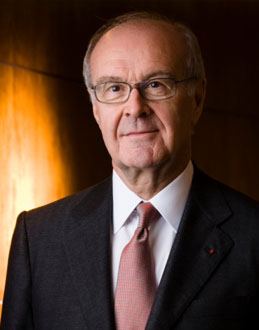Polytechnique graduate, tax inspector, former Principal Private Secretary of a Minister of the Economy, Jean-Louis Beffa’s former number two at Saint-Gobain, Guy Dejouany’s former number two at Compagnie Générale des Eaux, and former President of Deutsche Bank in France, Mr. Jacques-Henri David has held senior leading roles. We meet him as the President of CCAF (Commission for the Control of Financial Activities).
Could you describe the CCAF mission for us, please?
It has a quadruple role:
First, to contribute to implementing the regulation which applies to banks and asset management firms established in Monaco. It is a question of establishing the general activity framework of these institutions, the definition of the rules and, of course, the methods of control of those rules.
Then, we inspect all banks and asset management firms based in Monaco on a regular basis. Each institution is controlled around every three years. That is a high frequency compared with that observed in OECD countries as a whole. As Monaco is a small financial centre where everyone knows and rubs shoulders with each other, this type of control proves to be both effective and a deterrent for any deviation. It is a supervision role.
Our third mission is prevention, and this also is facilitated by the small size of the financial centre. Indeed, we can usually anticipate any difficulties and thus avoid problems. Customers, intermediaries and the AMAF (Monegasque Association of Financial Activities) inform us fairly regularly of what appears to them to be an irregularity, such as the marketing of financial products without authorisation. Then we act straight away.
Last, we have the power to punish banks or asset management firms whose conduct is not compliant with the law or ethics. This can go as far as withdrawing their authorisation. If necessary, and in the event of serious misconduct, we can also refer this to the Prosecutor General of Monaco.
Does your action give tangible results?
I would say our action has allowed problems to be avoided. For three years now, the financial centre has not encountered any significant incidents. Moreover, following the investigations the OECD conducted in Monaco in 2013 and early 2014, it has recently classified Monaco in the list of “white” countries i.e. those countries free of suspicion regarding the quality of their financial supervision and the ethics of the financial institutions based there, whereas for example Switzerland and Austria are still in the “grey list”. This is a very positive signal for the world of international investors.
Is it a “plus” for the attractiveness of Monaco?
Yes, of course, here investors benefit from conditions of security identical to those of the big financial centres such as Luxembourg and London. At present, the Monaco financial centre has around 100 billion euro under its management. With activity to promote the financial centre conducted in conjunction with the Prince’s government and AMAF, we can double or triple the amount of managed assets in 3 to 5 years. Moreover, this was one of the priority objectives which H.S.H. Prince Albert II set during his accession speech: “To contribute to make Monaco one of the hubs of reference in the financial area, by adding to its already renowned banking expertise, even more sophisticated know-how in asset management, and by developing investment capital.” In order to achieve this goal, we undoubtedly need to further professionalize our services for international customers. And in this regard, I can only welcome the initiatives AMAF has taken recently in conjunction with the CCAF and which have led to the recent implementation of a professional certification process.






